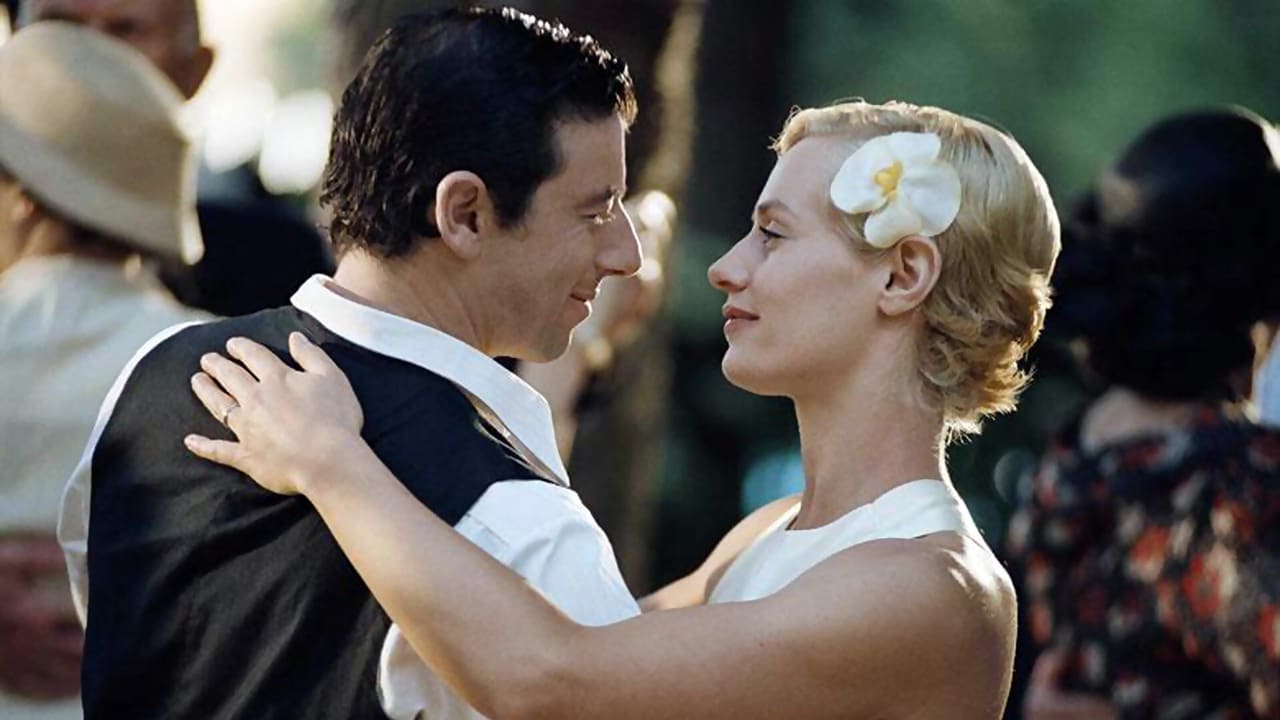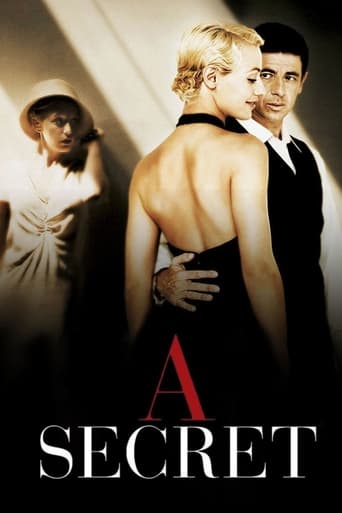

Purely Joyful Movie!
... View MoreBetter Late Then Never
... View MoreGreat example of an old-fashioned, pure-at-heart escapist event movie that doesn't pretend to be anything that it's not and has boat loads of fun being its own ludicrous self.
... View MoreThis is a gorgeous movie made by a gorgeous spirit.
... View MoreThis is the story of a French Jewish family that spans the years from the mid-1930s to the mid-1980s. The opening scenes, taking place in 1955, introduce us to two of the principal characters, Francois at age 7 and his mother Tania. Francois is seen as shy, skinny, and nonathletic, which is a contrast with his mother's being, strong, beautiful and an accomplished swimmer. Soon the scene shifts to 1985 where Francois is dealing with a shy son of his own. There is an unexpectedly touching scene where Francois' son tenderly grasps his father's arm while seated next to him at a table. The 1985 scenes are filmed in black and white and that helps in keeping the time frames straight, since there are many time shifts. In movies that jump around in time I always wonder what the effect would have been to present the story in a linear way. But, since we are kept in the dark about the secret referenced in the title, the plot device of jumping back and forth in time is a logical plot device and it required my attention.In 1955 we are introduced to Francois' father Maxime and Louise (a close family friend). Maxime is a handsome, athletic guy and that advances the theme of Francois' being mismatched in physical ability to Maxime and Tania. Francois feels that he is a disappointment to his dad. As portrayed, Maxime was in fact disappointed with Francois; a big reason why is revealed in the flashbacks to the 1930s.Early on in the 1930s Maxime is seen wanting to deny his Jewishness. It was not clear to me if he could see what was coming down the pike with the Nazis or whether his denial was coming from some more philosophical, intellectual, or intuitive basis. In one voice-over Francois comments, "Playing sports made dad hope he could erase his origins." In any case, how the characters relate to their Jewishness is at the very heart of the story.There is no end of stories that have come out of the Second World War, even some sixty years later. This movie is one of the better ones that concentrates on a single family's experiences rather than staging big battle scenes. The movie is based on the book, "Memory: A Novel," by Philippe Grimbert; we are told at the beginning that the story and its main characters are based on true events. I found the movie more engaging knowing that.The acting by all concerned is first rate, as is the filming. The unobtrusive score by Zbigniew Preisner is effective. I found the time sequencing, together with the large number of characters, made a first viewing challenging, particularly with having to read the English subtitles. A second viewing was rewarding.
... View MoreDirector Claude Miller ('The Little Thief')has gone and crafted a fine, taut,heartbreaking tale of repression,tragedy & truth,leading to closure. 'A Secret',adapted from the novel of the same name by author Phiiippe Grimbert,concerns a man,Francois,who as a young boy,had the feeling that he had an older brother. When he couldn't get a straight answer from his tight lipped family,he goes on a search for the truth & gets more than he bargained for. The film boasts of a fine cast,including Julie Depardieu,daughter of actor Gerard Depardieu,and the always welcome Ludivine Sagnier (Swimming Pool). The story's pace may be a bit slow for most Western viewers,but waiting it out will be well worth it,for the final solution. The film's visual look is a treat for the eye (with the present day sequences filmed in black & white, and the scenes that take place in the past which were filmed in colour,which may remind some viewers of 'Les Violins Du Bal'). Films like this deserve far better than they get (unlike any & all of the latest cine crapola that feature Pauly Shore or Adam Sandler). No rating,but contains nudity,sexual situations & some gruesome images of concentration camps that would be disturbing to youngsters under 15.
... View MoreClaude Miller has created one of the more challenging and intensely human dramas about World War II in his film UN SECRET (A SECRET). Though one of many stories about the plight of Jews during the events that lead up to and exploded into WW II, Miller's story is less about the cruel destiny of the Jews in Hitler's plundering of Europe than it is a study of a few individuals who struggled with their identity in the face of probable extermination. Based on a true story in Phillippe Grimbert's novel by the same name, UN SECRET gracefully and artistically draws the viewer into the psyche of the narrator François Grimbert (played at ages 7, 14 and 37 by Valentin Vigourt, Quentin Dubuis, and Matthew Almaric) whose relationship to his father Maxime (Patrick Bruel) has always been strained. The story winds from contemporary time, to the period in France before WW II, through the horrors of the Halocaust, and the years of rebuilding following the war. Maxime 'Grinberg' (Patrick Bruel) marries Hannah (Ludvine Sagnier) in a beautiful Jewish wedding. Hannah's brother is married to a brilliant athlete Tania (Cecile De France) and even at the wedding the equally athletic Maxime has eyes for Tania. All possible conflicts seem to diminish when Maxime and Hannah have a son, Simon (Orlando Nicoletti) who develops into a naturally gifted athlete the joy of Maxime's life. As WW II approaches the Jews of Paris are instructed to wear their yellow Star of David patches, and while Hannah feels pride in her race, Maxime refuses to be 'labeled' and defies the ruling. When the SS come to transport Jews out of Paris, Hannah and Simon are removed to a camp while Maxime manages to stay in Paris with a new French name. Popular as a fashion model and designer, Tania is able to stay unnoticed as a Jew also, but her husband is off to war and extermination. Maxime and Tania learn of their families' demise and bond, eventually marrying using French names (Grimberg becomes Grimbert), join the Catholic Church and have a son François who is nothing like Simon nor does he know of his father's rejection of him as a poor comparison to the perfect Simon But as the years pass François discovers his family's past and a reconciliation with his Jewish heritage confronts him. How the maturing François ultimately relates to his distant father brings closure to the story. The cast is excellent, including some of the lesser roles - especially the ever-present Louise (Julie Depardieu) - played by gifted actors. Claude Miller's recreation of time lapses is successfully highlighted by interchanging black and white with color photography (by cinematographer Gérard de Battista) and the changing moods of the story are greatly enhanced by the musical score by Zibigniew Preisner. UN SECRET, then, is a stunning work that explains many aspects of the varying responses of Jews to that horrid period of history designed by Hitler. It is a deeply satisfying and profoundly moving film. Highly recommended.
... View MoreWhat's the difference between a film and a movie? Or is there one? Well, some works are definitely both...Hitchcock, Sirk...but, what's my point? Oh, yeah...this is a MOVIE. Like, well maybe I've seen too much Ozu or something, but I think ONE glance from Patrick towards Cecile ON HIS WEDDING DAY would've really made the point - would've made the point a lot better than it was made. From that moment on, I was in danger of checking out. If I ever see this film again, I promise to count how many times he checks HER out in that one poor sequence. It's at least 20 times - ridiculous.I don't like having my cinephilia insulted in this way. And the Kitsch of it is, from that moment on, we are launched into some kind of weird Freudian/Lacanian scenario where The Return of the Repressed meets The Primal Scene. Every time we see Tania's taut buttocks in that clingy bathing suit that covers her va-va-voom body, every time we are thrown back into that most Portnoy-ish of Selfhating Wet Dreams, where the Blond Shiksa is a Full-Blooded Jewess, we both can't wait for Mommy to die so that we can be together with the Babe, and we hate ourselves for feeling like this. Guilt - yummy! It takes away the feeling of prurience and lays "high seriousness" on top of it - one of the classic Kitsch layer cakes. So why the Seven rating? Because if you leave out the fact that Miller really doesn't trust his viewers to think for themselves, there is something powerful in this film, the way it links Frenchness and Holocaust Denial, the way it shows how Jewishness is such a complex construction which conflates Race, Religion and Culture. But careful which films you quote if you're not on their level: Grand Illusion is name-checked, bits of Night and Fog are shown, and isn't the Bal Musette after the Klezmer Wedding (a really nice musical transition, by the way) shot at the same hall as the the famous Lesbian Dance in The Conformist? It sure looks like it. Pardon My French, but Vive La Difference!
... View More